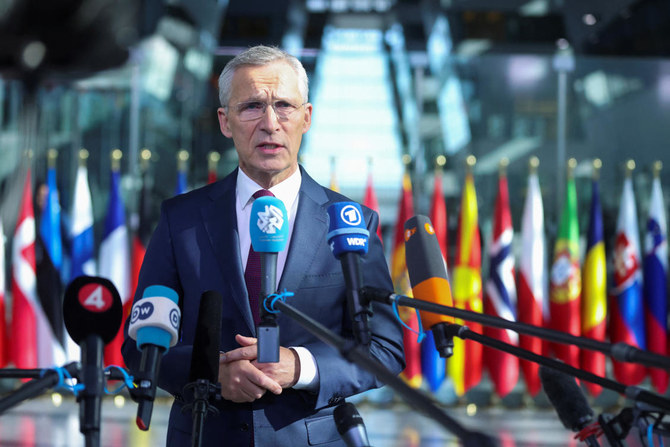BRUSSELS: NATO defense ministers gathered Thursday hoping to agree on a new plan to provide long-term security assistance and military training to Ukraine, after Hungary promised not to veto the scheme as long as it’s not forced to take part.
The ministers are meeting over two days at NATO headquarters in Brussels in the last high-level talks before a summit hosted by US President Joe Biden in Washington on July 9-11, where the military organization’s leaders are expected to announce financial support for Ukraine.
Ukraine’s Western allies are trying to bolster their military support as Russian troops launch attacks along the more than 1,000-kilometer (620-mile) front line, taking advantage of a lengthy delay in US military aid. European Union money was also held up by political infighting.
NATO Secretary-General Jens Stoltenberg, who is chairing Thursday’s meeting, said that Ukraine’s beleaguered armed forces need longer-term predictability about the kinds of weapons, ammunition and funds they can expect to receive.
“The whole idea is to minimize the risk for gaps and delays as we saw earlier this year,” Stoltenberg told reporters. The hold-up, he said, “is one of the reasons why the Russians are now able to push and to actually occupy more land in Ukraine.”
Since Russia’s full-fledged invasion in February 2022, Ukraine’s Western backers have routinely met as part of the Ukraine Defense Contact Group, run by the Pentagon, to drum up weapons and ammunition for Kyiv. A fresh meeting was held at NATO headquarters on Thursday.
While those meetings have resulted in significant battlefield support, they have been of an ad-hoc and unpredictable nature. Stoltenberg has spearheaded an effort to have NATO take up some of the slack.
The idea is for the 32-nation military alliance to coordinate the security assistance and training process, partly by using NATO’s command structure and drawing on funds from its common budget.
Stoltenberg said he hopes Biden and his counterparts will agree in Washington to maintain the funding level for military support they have provided Ukraine since Russia launched its full-fledged invasion in February 2022.
He estimates this at around 40 billion euros ($43 billion) worth of equipment each year.
On Wednesday, Hungary announced that it would not veto the plan as long as it’s not forced to take part.
“I asked the Secretary-General to make it clear that all military action outside NATO territory can only be voluntary in nature, according to NATO rules and our traditions,” Prime Minister Viktor Orbán said. “Hungary has received the guarantees we need.”
The world’s biggest security alliance does not send weapons or ammunition to Ukraine as an organization, and has no plans to put troops on the ground. But many of its members give help on a bilateral basis, and jointly provide more than 90 percent of the country’s military support.
The other 31 allies see Russia’s war on Ukraine as an existential security threat to Europe, but most of them, including Biden, have been extremely cautious to ensure that NATO is not drawn into a wider conflict with Russia.
NATO operates on the basis that an attack on any single ally will be met with a response from them all.
NATO defense ministers thrash out new security aid and training support plan for Ukraine
https://arab.news/gjuwu
NATO defense ministers thrash out new security aid and training support plan for Ukraine

- NATO Secretary-General Jens Stoltenberg says Ukraine’s beleaguered armed forces need longer-term predictability about the kinds of weapons
Indonesia’s first woman president awarded honorary doctorate by Princess Nourah University

- Megawati was recognized for her leadership and contributions to social, legal affairs
- She has received 10 other honorary degrees from Indonesian and foreign institutions
JAKARTA: Megawati Sukarnoputri, who served as Indonesia’s fifth president and was the country’s only female head of state to date, has been awarded an honorary doctorate by Princess Nourah bint Abdulrahman University in Riyadh, becoming the first foreign national to receive the title.
Megawati, the eldest daughter of Indonesia’s first President Sukarno and chairwoman of the country’s largest political party, the PDIP, served as president from 2001 to 2004.
The 79-year-old was awarded an honorary doctorate in organizational and legal affairs in Riyadh on Monday during a ceremony overseen by Princess Nourah University’s acting president, Dr. Fawzia bint Sulaiman Al-Amro.
“This recognition was given in appreciation of her efforts during her presidency, her significant contributions to social, organizational, and legal fields, and her role in strengthening institutional leadership in Indonesia,” the university said in a statement.
This is Megawati’s 11th honorary doctorate. She has received similar degrees from Indonesian and foreign universities, including the Moscow State Institute of International Relations in 2003 and the Soka University of Japan in 2020.
She has also been awarded the title of honorary professor by several institutions, including by the Seoul Institute of the Arts in 2022.
“We gather at the Princess Nourah bint Abdulrahman University, a university that stands as a symbol of women’s progress in education, knowledge and public service … To see so many intelligent women, I feel very proud,” Megawati said in her acceptance speech.
“Women’s empowerment is not a threat to any values, culture or tradition. It is actually a condition for nations that believe in their future … A great nation is one that is able to harness all of its human potential. A strong nation is one that does not allow half of its social power to be left on the sidelines of history.”
Megawati is the longest-serving political leader in Indonesia. Indonesia’s first direct presidential elections took place during her presidency, consolidating the country’s transition to democracy after the downfall of its longtime dictator Suharto in 1998.












